
The Admiral Petre Bărbuneanu-class corvette is a series of four corvettes designed and constructed for the Romanian Naval Forces primarily for anti-submarine warfare. Only two corvettes out of a total of the four are still in service. Designed and constructed in the 1980s, they are a product of the Cold War with their armament and sensors based on Soviet designs. This class of corvettes was superseded by the Rear-Admiral Eustațiu Sebastian (Tetal-II) class.

The Anshan-class destroyers were the People's Liberation Army Navy's (PLAN) first destroyers. They were ex-Soviet Gnevny-class destroyers purchased in the 1950s. The Chinese later added HY-2 anti-ship missiles and removed some of the torpedo tubes, and redesignated as Type 6607. All four ships of the class had been stricken by 1992.

The Type 051 destroyer was a class of guided missile destroyers based on the hull of the Soviet Neustrashimy-class destroyer deployed by China. It was the first guided missile destroyer fielded by the People's Liberation Army Navy (PLAN), and the first designed and built in China. 17 were built from 1970 to 1990; it was not until the 21st century that China would again build a class in such large numbers.

The Type 052 (NATO/OSD Luhu-class destroyer is a class of destroyers developed in the People's Republic of China for the People's Liberation Army Navy. The Type 052 was an intermediate between the obsolescent Type 051 and the modern Type 052B destroyers. They were the first PLAN destroyers powered by gas turbines, and the first PLAN ships with modern combat direction systems. They were also part of the first generation of PLAN warships armed with surface-to-air missiles in the form of the short-range Crotale

The OTO Melara 76 mm gun, being marketed as the OTO 76/62 Gun Mount, is a naval autocannon built and designed by the Italian defence company OTO Melara. It is based on the OTO Melara 76/62C and evolved toward 76/62 SR and 76/62 Strales.

The KS-30 is a Soviet 130mm anti-aircraft gun that appeared in the early 1950s, closely resembling the German wartime 12.8 cm FlaK 40 anti-aircraft gun. The KS-30 was used for the home defense forces of the USSR and some other Warsaw Pact countries. Recognition features are the heavy dual-tire carriage, a firing platform which folds up to a 45 degree angle when the piece is in travel, and the long clean tube without a muzzle brake. The breechblock is of the semi-automatic horizontal sliding-wedge type, and the piece is fitted with a power rammer and an automatic fuze setter. Fire control is provided by the PUAZO-30 director and the SON-30 radar. The ammunition is of the fixed-charge, separated type. It is not interchangeable with that of the 130 mm field guns or the WWII-era naval and coastal guns, but the cartridge case is the same as in 130 mm/58 (5.1") SM-2-1 (Soviet) and Type 76 (Chinese) naval guns as well as in SM-4-1 coastal gun. The KS-30 is now held in war reserve since it was replaced by surface-to-air guided missiles.

The Type 143 Albatros class was a class of missile bearing fast attack craft. Each vessel is named after a bird of prey including the albatross, condor and cormorant. Constructed by German shipbuilders Lürssen and Kröger, the vessels were intended to replace the Type 141 Seeadler class. The German Navy retired the class in 2005 and sold the boats off to Tunisia and Ghana.

The 37 mm automatic air defense gun M1939 (61-K) is a Soviet 37 mm calibre anti-aircraft gun developed during the late 1930s and used during World War II. The land-based version was replaced in Soviet service by the AZP S-60 during the 1950s. Guns of this type were successfully used throughout the Eastern Front against dive bombers and other low- and medium-altitude targets. It also had some usefulness against lightly armoured ground targets.

HMS Eden was a Hawthorn Leslie type River-class destroyer ordered by the Royal Navy under the 1901 – 1902 Naval Estimates. Named after the River Eden in northern England, she was the second ship to carry this name since it was introduced in 1814.
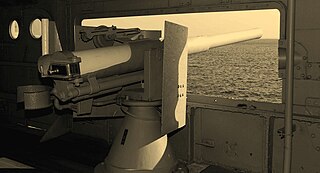
The QF 12-pounder 12-cwt gun (Quick-Firing) was a common, versatile 3-inch (76.2 mm) calibre naval gun introduced in 1894 and used until the middle of the 20th century. It was produced by Armstrong Whitworth, Elswick and used on Royal Navy warships, exported to allied countries, and used for land service. In British service "12-pounder" was the rounded value of the projectile weight, and "12 cwt (hundredweight)" was the weight of the barrel and breech, to differentiate it from other "12-pounder" guns.

The Miura-class landing ship tank is a class of three tank landing ships (LSTs) that served with the Japanese Maritime Self-Defense Force (JMSDF) from 1975 to 2002. They were primarily deployed for logistic support but were also used to carry heavy construction equipment such as trenchers.

155 mm is a NATO-standard artillery shell caliber that is used in many field guns, howitzers, and gun-howitzers. It is defined in AOP-29 part 1 with reference to STANAG 4425.
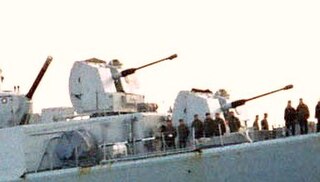
The 76mm/L62 Allargato is a single barrel, medium caliber, dual purpose automatic naval cannon designed and produced in the 1960s by the Italian defence firm of OTO-Melara as the cannon armament for all medium and large warships built for the Italian Navy in that decade. Currently, the gun remains in service with Italy's Cassiopea-class patrol vessels but has otherwise been largely replaced by the Otobreda 76 mm series of cannons.
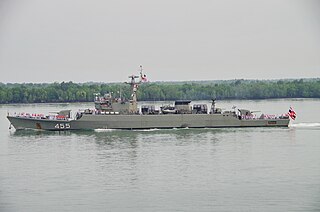
HTMS Chao Phraya (FFG-455) is the lead ship of her class of frigates for the Royal Thai Navy, a variant of the Chinese-built Type 053H2 frigate.
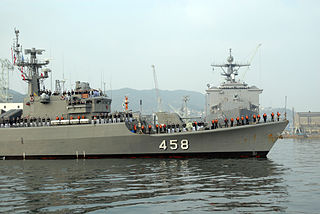
HTMS Saiburi (FFG-458) is the fourth ship of Chao Phraya-class frigate of the Royal Thai Navy, a variant of the Chinese-built Type 053H2 frigate.

The Type 056 corvette is a class of warship deployed by the Chinese People's Liberation Army Navy (PLAN). They replace older patrol craft and some of the Type 053H frigates. The first Type 056 entered service in February 2013. An anti-submarine warfare (ASW) variant, commonly known as Type 056A, has also entered service. Following construction of Aba in December 2019, China ceased building Type 056 corvettes to focus on procuring bigger warships for high sea missions. In 2021, the PLAN transferred all 22 Type 056 to the China Coast Guard while retaining the Type 056A.
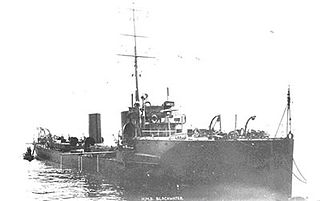
HMS Blackwater was a Laird-type River-class destroyer ordered by the Royal Navy under the 1902–1903 Naval Estimates. Named after the River Blackwater in southern England near London she was the first ship to carry this name in the Royal Navy.
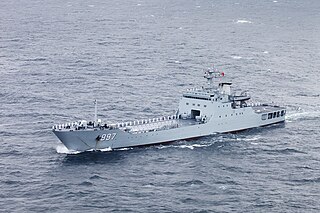
The Type 072A landing ship is a class of amphibious warfare ship in the Chinese People's Liberation Army Navy.

HNLMS Van Speijk (F802) was a frigate of the Van Speijk class. The ship was in service with the Royal Netherlands Navy from 1967 to 1986. The ship's radio call sign was "PAVA". She was sold to the Indonesian Navy where the ship was renamed KRI Slamet Riyadi (352). The ship was decommissioned in 2019.

HTMS Bangpakong (FFG-456) is the second ship of Chao Phraya-class frigate of the Royal Thai Navy, a variant of the Chinese-built Type 053H2 frigate.




















